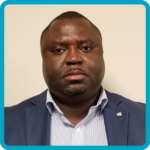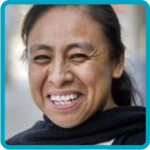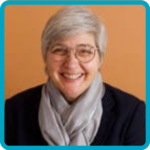The Iowa City Foreign Relations Council (ICFRC) seeks to promote greater understanding of international issues by hosting community discussions featuring expert speakers from around the world. ICFRC’s current project, “Refugees and Immigrants in Iowa” is a six part educational series intended to amplify the voices of refugees and immigrants, as well as highlight the state and local agencies who welcome and support them.
Catherine McAuley Center’s Employment Services Case Manager, Rex Mwamba and Elizabeth Bernal, on CMC’s Board of Directors, were featured as key speakers on the project’s latest discussion, “Life in Iowa as a Refugee and Immigrant.” Along with Rex and Elizabeth, other key speakers include Zalmay Niazy, owner of Zee’s Handyman Services, LLC and Ines Pecuvcic-Jasarovic, Refugee Specialist for the Bureau of Refugee Services in Des Moines.
Moving to a new country is a big change, bringing new challenges, as well as new opportunities. In this session they discuss how the experience of moving to Iowa differs for people from different walks of life – refugee, immigrant, documented, undocumented, those with familial ties in the area and those without. Also discussed are the many agencies who support new Iowans, and ways that people native to the United States can help to make refugees and immigrants feel safe and welcomed.
Each speaker shares some of the main challenges facing refugees and immigrants they work with, and the difficulties they face themselves after migrating to Iowa. Apart from the cold weather, each agrees that language is the one of the biggest obstacles, followed by having few or no local family ties and support. Elizabeth and Rex explain, coming to a new country, you don’t have the language, the support, or the resources you need, and it’s extremely difficult. Each person comes to a new country from different issues, but they all come to feel safe. Being in a new place unable to understand anyone and not knowing who to ask for help can feel overwhelming.
Another difficulty is the common misconception about the various immigration statuses and the reasons people migrate to the United States. Immigrants are people with “a strong desire to move from a country to another country. They decide themselves they want to move to another country, maybe to have a better life.” says Rex – “But refugees, it’s totally different. Refugees are forced from their country to another…They didn’t want to come…they were forced to.” Zalmay further explains that refugees and immigrants, including newly arrived Afghans, had homes, jobs, and some type of normal life before they came to the United States, and they face new problems here.
Knowing these challenges, what can native Iowans do to help refugees and immigrants adjust to life in Iowa? Elizabeth says it can be as simple as a smile – “With one smile I think they feel welcome. If you just go and say hi to your neighbor and want to learn more, just be open to learning more about your neighbor or other people…You can be really friendly to people and that makes a huge difference I think for anyone…Now it’s not only for refugees and immigrants, but I think everyone needs a smile…no matter where you come from.”
She also explains that if someone seems unresponsive to your welcoming, try to remember that they may have trauma from their past, you don’t know the path they left behind. If refugees and immigrants already have those challenges, to make it less heavy on their shoulders – support them, welcome them, as simple as offering one smile, they feel like they have access to somebody. Elizabeth says from her personal experience, that kindness makes the community feel like a safe place for refugees and immigrants who often question if they’re welcome.
Ines reminds us that others often forget to consider the traumatic experiences that refugees endured coming from war zones, from conflict zones – “We need to be open, we need to be good listeners, and learn from these newcomers…Language is not always an obstacle. There are ways to understand people even if you don’t speak the same language.”
Another simple way to be welcoming? “Put yourself in their own shoes, share a meal with a refugee or an immigrant, do something to hear and learn about their experiences. They are amazing people, they are survivors, and there are great organizations that are ready to serve them” says Ines.
Organizations like the Catherine McAuley Center (CMC) and the Bureau of Refugee Services provide opportunities aimed at minimizing these challenges and offering a community of support. Life for refugees and immigrants, agreed the speakers, would be even more difficult without services and organizations to assist them.
Speaking about his role at Catherine McAuley Center, Rex explains CMC’s program that helps refugees when they first arrive by providing cash assistance, help finding homes, employment and job-seeking support, and connection to other agencies and resources. “Once they start working and become self-sufficient…they can be on their own, and if they need to change their job, or they need education, or they need something else, we will always be there to help.”
Watch the full program and gain deeper insight into what Iowans and those native to the United States should know about their neighbors from other countries, the obstacles they face, and steps you can take to be welcoming and supportive.

Rex Mwamba is the Employment Services Case Manager at Catherine McAuley Center, and the founder of his company, World Development. Born in and originally from the Democratic Republic of Congo (DRC), Rex arrived in the United States in 2013 to pursue his career. Rex has a bachelor’s degree in Computer Science, Telecommunication and Network Administration from the DRC. After he completed the English program at Kirkwood Community College , Rex obtained an IT certificate and an associate degree in Network & System Administration. Today, Rex furthers CMC’s mission by resettling and integrating refugees from all over the world into the Cedar Rapids community.

Elizabeth Bernal serves on the Catherine McAuley Center’s board, and she also works as a cultural liaison for Iowa City schools. Elizabeth arrived in the United States from Mexico City when she was 18 years old. She is co-founder of Open Heartland, a nonprofit serving families in Johnson County mobile home communities whose residents are mainly Hispanic immigrants. She’s a founding member of the board of Eastern Iowa Community Bond Project, an organization that pays immigration bond for incarcerated Iowa immigrants who cannot afford their bond. Elizabeth also serves on the Center for Worker Justice of Eastern Iowa’s board, and she was inducted into the Iowa Latino Hall of Fame in 2021.

Zalmay Niazy is the owner of Zee’s Handyman Services, LLC in Iowa Falls. He was born in a rural village in the Urozgan province of Afghanistan and learned to speak fluent English at the age of thirteen. Zalmay worked as an interpreter for several branches of the United States armed forces upon graduating from high school. He has a bachelor’s degree in Business Administration from Kardan University in Kabul, and he has worked for different national and international organizations, including Titan Linguists, Red Orange International, and Qabaiel General Supplies.

Ines Pecuvcic-Jasarovic is a Refugee Specialist for the Bureau of Refugee Services in Des Moines, where she has worked for 26 years. She was born and raised in Sibenik, Croatia and graduated from the University of Sarajevo in Bosnia and Hercegovina in 1988 with a degree in teaching. Due to the conflict in former Yugoslavia, Ines, her husband, and their daughter had to flee Bosnia in1992 and started a refugee journey across Croatia, resettling in Chicago in 1993. Her spouse was reunited with the family in 1995. Ines also worked for Interchurch Refugee and Immigration Services in Chicago, and today she provides several services to prepare clients for their employment and education goals.
